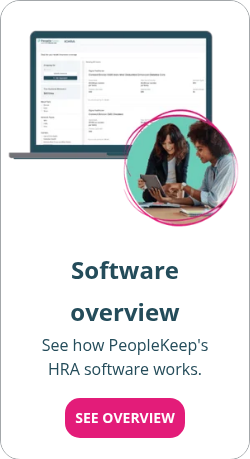Individual coverage HRAs (ICHRA) and Medicare
By Holly Bengfort on January 9, 2025 at 3:30 PM
The individual coverage health reimbursement arrangement (ICHRA) is a great option for employers who want to provide affordable health benefits to their employees. It gives employees the freedom to choose the insurance plans that fit their specific needs.
However, for many Medicare-eligible employees, the relationship between ICHRAs and Medicare can be complex, often leading to confusion and misconceptions.
In this article, we’ll explore how ICHRAs and Medicare interact.
In this blog post, you'll learn the following:
- How Medicare beneficiaries can benefit from an ICHRA.
- Which Medicare Parts an ICHRA can reimburse.
- How PeopleKeep can help you offer a compliant ICHRA to your team.
What is ICHRA?
The ICHRA is an employer-sponsored health benefit. It provides employers with a flexible approach to healthcare coverage. It allows them to reimburse employees for health insurance coverage instead of offering them a traditional group health insurance plan.
Under this arrangement, employers offer a specific amount of money tax-free for their eligible employees. Employees purchase individual health insurance plans that best suit their needs and request reimbursement for those premiums. In addition to using their allowance for individual health insurance premiums, employees can also get reimbursed for more than 200 other types of out-of-pocket medical expenses.
Some examples of eligible expenses include:
- Monthly premiums for health, vision, and dental plans
- Preventive services
- Emergency care
- Prescription drugs
- Over-the-counter medication
There are no annual limits on contribution amounts with an ICHRA, so employers can offer their employees as much as they'd like in allowances. They can also vary allowances using 11 employee classes. An employee needs their own individual health insurance policy to participate in the ICHRA.
What is Medicare?
Medicare is a federal health insurance program for individuals 65 and older. It also covers some younger people with disabilities. As of September 2024, 68 million individuals had Medicare coverage1.
There are four types of Medicare available:
- Medicare Part A covers hospital insurance
- Medicare Part B covers outpatient medical services
- Medicare Part C includes Medicare Advantage plans
- Medicare Part D provides prescription drug coverage
Medicare helps to reduce medical costs for eligible individuals, covering various healthcare services and treatments to ensure access to essential care.
How do ICHRAs and Medicare interact?
It’s common for employees of small businesses to opt for Medicare over their employer’s group health insurance plan because the benefits are often better. Even so, Medicare recipients also tend to have more healthcare expenses. Employers might also want to offer an ICHRA to their entire workforce, including those with Medicare.
For this reason, many employers wonder if the ICHRA might be a way to help these employees with their out-of-pocket expenses.
Scenario 1: You only offer the ICHRA and no group health plan
If you plan to offer the ICHRA to all of your employees, those with Medicare can participate in the benefit. Employees must have individual health insurance coverage to take part in the ICHRA. As long as employees have Medicare Parts A and B or Medicare Part C, this counts as qualifying individual health insurance.
You can then reimburse these employees for their Medicare premiums and out-of-pocket medical costs.
If you currently offer a group plan, some of your employees with coverage through Medicare and your group plan may only have Part A coverage. Canceling your group coverage and offering an ICHRA can create a special enrollment period (SEP) for Medicare. This allows them to also enroll in Part B coverage so that they can participate in the ICHRA.
Scenario 2: Offering an ICHRA and a group health plan to different employees
If you’re looking to only offer Medicare-eligible employees an ICHRA, there are a few rules to consider. Employees can’t have an ICHRA if you also offer them a group health insurance plan. You also can’t offer employees a choice between the ICHRA or a group plan. The federal government established these guidelines in 54.9802-4(c)(2) of the final rule for Health Reimbursement Arrangements and Other Account-Based Group Health Plans2.
If you want to offer a group plan and an ICHRA, you can use employee classes to offer some classes a group plan and others an ICHRA.
This means that if an employer can place all of their Medicare-eligible employees into the same class, they can offer that class an ICHRA, as long as they don't offer any employees in this class a group health insurance plan.
The classes of employees include:
- Full-time employees
- Part-time employees
- Seasonal employees
- Temporary employees
- Salaried employees
- Hourly workers
- Employees in a waiting period
- Foreign employees who work abroad
- Employees in different locations
- A combination of two or more of these classes
These classes must be “bona fide.” You can’t exclude employees who fit the class definitions from a class.
Which Medicare parts can ICHRA reimburse?
To be eligible for an ICHRA, an employee who qualifies for Medicare must have coverage under both Part A and Part B or opt for Part C. Having only Part B does not meet the criteria for minimum essential coverage (MEC).
Employers can use ICHRAs to reimburse costs for Medicare premiums and supplemental health insurance (Medigap), in addition to various medical care expenses. This includes reimbursements for premiums associated with Parts A, B, C, D, and Medigap policies.
How does Medicare work with QSEHRA?
While the ICHRA works for organizations of all sizes, the qualified small employer HRA (QESHRA) is for organizations with fewer than 50 full-time equivalent employees (FTEs) that don’t offer a group plan. Like the ICHRA, Medicare beneficiaries can use their QSEHRA allowance to cover eligible medical costs, including individual health insurance premiums.
Read our article to learn which Medicare plans work with the QSEHRA and under what conditions.
PeopleKeep makes offering ICRHAs easier
If you want to offer hassle-free health benefits, PeopleKeep can help! With our ICHRA administration platform, you can provide personalized health benefits to your diverse team in just minutes each month.
We ease the administrative burden of offering an ICHRA by:
- Customizing your ICHRA to the specific needs of your workforce.
- Reviewing employees' reimbursement requests for eligible healthcare expenses.
- Creating your legal plan documents.
- Sending automatic notices to employees on your behalf.
- Providing award-winning customer support.
Additionally, your employees can shop for individual health plans and ancillary benefits directly from their PeopleKeep dashboard. They can compare health policies based on network type, metal tier, or carrier. We also offer free health insurance advisements to help them navigate their options.
Conclusion
ICHRAs are health benefits that offer flexibility and cost control, unlike traditional group health insurance. Employees with Medicare can participate in the ICHRA. Employers can easily reimburse them for Medicare premiums and other out-of-pocket medical costs.
Ready to offer an ICHRA at your organization? Schedule a call with one of our HRA specialists today to get started!
This blog article was originally published on July 16, 2020. It was last updated on January 9, 2024.
Check out more resources
See these related articles

Who is eligible for the individual coverage HRA (ICHRA)?
Find out who qualifies for the Individual Coverage HRA (ICHRA). Explore ICHRA eligibility rules and how they benefit both employers and employees.
![Business owner eligibility under an ICHRA [infographic]](https://www.peoplekeep.com/hubfs/All%20Images/Featured%20Images/business%20owner%20eligibility%20under%20an%20ICHRA_fb.jpg)
Business owner eligibility under an ICHRA [infographic]
Wondering if you're eligible for an ICHRA as a business owner? This infographic breaks down the requirements to help you determine your ICHRA eligibility.

How does the ICHRA special enrollment period work?
Learn how the ICHRA special enrollment period (SEP) works. Understand eligibility, key dates, and how employees can enroll in individual health coverage.



